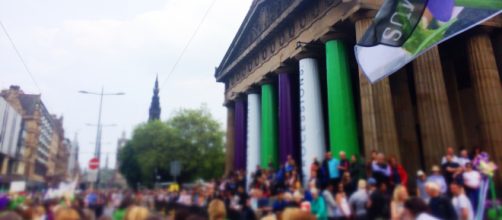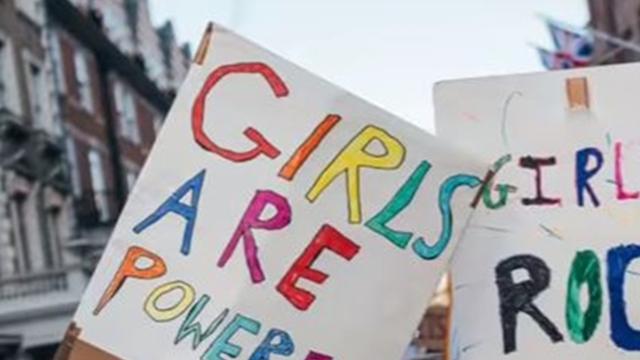Across the UK on Sunday 10 June, thousands of women and girls took part in processions marking the centenary of women being granted the right to vote. Organised by Artichoke and 14-18 Now, processions celebrating the 1918 Representation of the People Act took place in the capital city of each part of the UK. Every person taking part was given a coloured scarf - made from either violet, white, or green fabric – to wear at the start of the route where different lines were formed for each colour. The chosen colours were those used by the suffragettes when campaigning for women’s suffrage in the 20th century.
The creative director, Darrell Vydelingum’s, aim was for the rows of different coloured scarfs to form giant-sized, moving, suffragette scarves along the roads that each procession went along. Hence, each of the processions was a large-scale participatory artwork.
Women of all ages, ethnicities, and backgrounds took part in this one-off event of unity, and various press reporters and members of the public lined the streets along the processional routes. Many of those watching cheered and clapped as the procession passed their part of the route creating a great atmosphere.
Our #PROCESSIONS2018 #artwork in full swing in #London. What a view!!! 💜💚 pic.twitter.com/RTrPV8zhQC
— PROCESSIONS2018 (@processions2018) June 10, 2018
Women and banners
As well as the wearing of coloured-scarves by the women and girls, many of the participants had designed creative banners celebrating the granting of the right to vote to women.
Some of these banners were commissioned by the event organisers and involved the collaboration of 100 artists from around the UK working with different community projects and groups to create special banners for each one. Many other banners were created by those inspired by the event website’s guides to making banners and posters. The banners all had the common theme of women’s rights and equality but varied in their emphases. Some focused on the right to vote, others celebrated the work of individually named suffragettes, others on minority women, with others, highlighted issues affecting women on a global scale in the current climate. Examples of the quotes on banners include, “Women are powerful.
Speak out. Be strong” and, the suffragettes’ famous motto, “Deeds not words.”
Various organisations took part including Girlguiding, the Women’s Institute, and Welsh Women’s Aid. Groups and individuals from different parts of the UK travelled from their own areas to their closest participating city whether that be, London, Belfast, Cardiff, or Edinburgh.
There were also some creative costumes to be seen as some participants chose to dress as the suffragettes wearing long dresses, floral-topped hats, and tri-coloured sashes. Others wore t-shirts with quotes. Flags were waved in the air and cog rattles (more commonly known as football rattles) were spun.
The event received live television coverage from the BBC in a special programme to mark the Processions.
A ‘human banner’ created in Green, White and Violet – the colours of the suffragette movement - passed by Edinburgh's landmarks, finishing up at Holyrood earlier today@artichoketrust pic.twitter.com/wdmYPKFAuo
— 14-18 NOW (@1418NOW) June 10, 2018
And #PROCESSIONS2018 Belfast is just coming to an end too@artichoketrust #1418NOW pic.twitter.com/Bqy2P7iEDs
— 14-18 NOW (@1418NOW) June 10, 2018
The suffragettes and women’s suffrage
The suffragettes are seen as one of the key reasons for women achieving the right to vote. Formed by Emmeline Pankhurst in 1903, The Women’s Social and Political Union (WSPU) was a women-only group formed to pressure the government into allowing women to vote. The members of the WSPUs were known as suffragettes.
One of their ways of raising awareness for their cause was by going on marches while displaying banners and therefore this is where the inspiration for Processions 2018 came from.
The first political legislation which allowed women to vote was the 1918 Representation of the People Act but this did not give universal suffrage, only suffrage to women over the age of 30. It was followed 10 years later by the 1928 Equal Franchise Act which granted the universal vote to women making their voting rights equal to men.
The CEO of one of the organisers, creative company Artichoke, Helen Marriage, has said that “The 100th anniversary of the passing of legislation which made universal suffrage unstoppable is a moment for celebration and reflection.”




